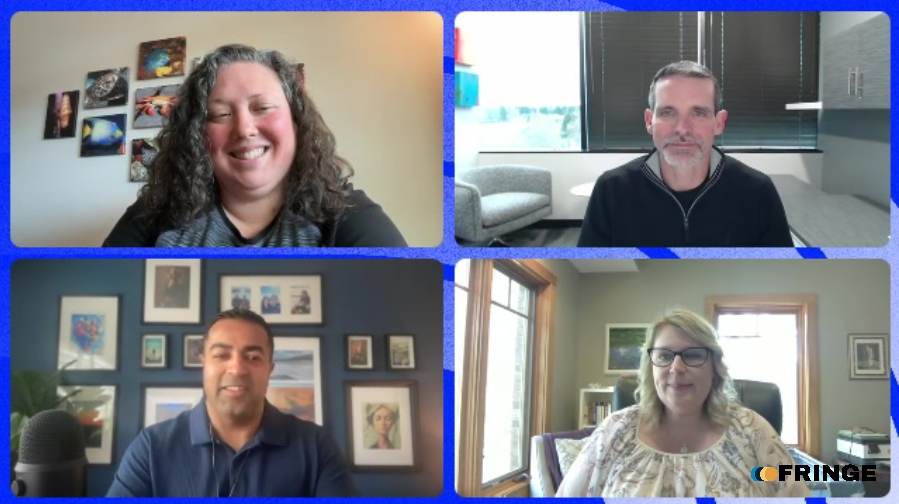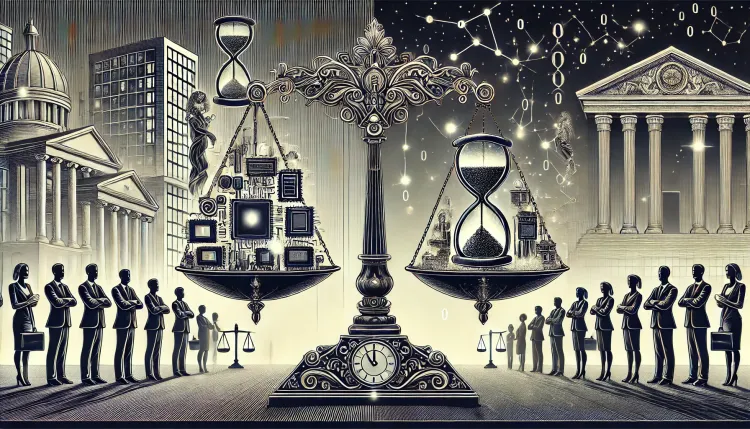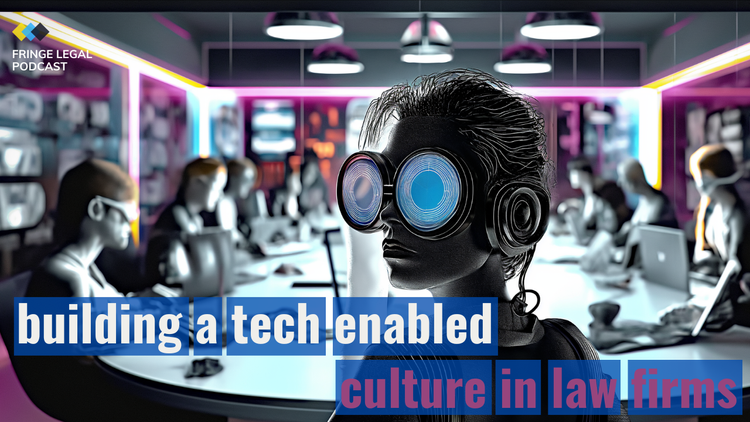Rasmeet Charya – Using technology to maximize the value of legal services
SUBSCRIBE AND REVIEW: iTunes // Spotify // Pocket Casts // Stitcher
Rasmeet Charya is the Chief Innovation Officer at Algo Legal. As Chief Innovation Officer, Rasmeet brings a strong passion for transforming how law firms and lawyers work with clients and think about innovation. From understanding problems, curating ideas, and facilitating innovation processes, Rasmeet leads a team that focuses on analyzing how technology can be used by the firm to enhance transparency, increase access, create efficiencies, and offer a new brand of service.
Algo Legal is a new law firm, established in 2019, and the firm has started with a strong foundation in technology.
As they got started the leadership wanted to create a new brand of legal services, driven by technology and innovation, and utilizing a process-driven approach to deliver a unique experience for their clients.
During my chat we explore how:
- How to apply a process-driven approach to your practice
- Different ways in which Algo Legal has been involved in the community via law schools and supporting startups
- How the Algo team pitches their process-driven approach, embedded with technology to clients
You can connect with Rasmeet on LinkedIn, and find out more about Algo Legal on their website.
Transcript
Ab: [00:00:00] Hello, everyone. Welcome to Fringe Legal I’m delighted today to have Rasmeet Charya, as my guest Rasmeet is the chief innovation officer at Algo Legal based in India. Rasmeet brings a strong passion for transforming how law firms and lawyers work with clients and think about innovation from understanding problems, curating ideas, and facilitating the innovation process.
[00:01:27] Rasmeet leads a team that focuses on analyzing how technology can be used by the firm to enhance transparency, increased access, create efficiencies, and offer a new brand of service. Rasmeet so nice to have you on the show. Thank you for joining me.
[00:01:43] Rasmeet Charya: [00:01:43] Thanks. Abhijat thanks for having me on the show.
[00:01:45]Ab: [00:01:45] I’m excited for this conversation because Algo Legal is a newish law firm. So in the last two years or so and that means that there’s a lot of exciting things that you are doing and that you’re able to really start from scratch. So I’m quite I’m looking forward to digging into that.
[00:02:04] Rasmeet Charya: [00:02:04] Yeah, sure. Algo Legal started in August, 2019, And as you would see on our website Algo Legal is a firm where we started with a niche practice of picking up of VC and PE by VC. The venture capital Lando equity related transactions, deal management.
[00:02:26] And from there, we also definitely went into advisory and the entire ecosystem related to that kind of practice. Algo Legal name gets its inspiration from the word algorithms. So primarily we definitely believe that the practice of law is in a way , very similar to when an algorithm wherein, you can actually define a lot of steps processes, and that’s what leads to a very solution oriented approach.
[00:02:57] So that’s how we came up with the Algo Legal as a name. And definitely it was coined by Sandeep, who is the founder and the managing partner of Algo Legal. And Sandeep himself is a thought leader in Legal tech industry. He’s a very innovative and an excellent business lawyer. And definitely he wanted to create a new brand of legal services, which is very much driven by technology, innovation, and so that, we can provide a very unique experience and create some value for our clients. So that was the entire I would say the background, the mission, vision of Algo Legal and definitely expertise is one of the key area. We have a whole lot of sport lawyers, I would say, are really industry experts in the practice areas.
[00:03:49] But at the same time, we would like to leverage technology as the, as innovation so that we can create a very different kind of value for it.
[00:03:58] Ab: [00:03:58] Yeah. And I think what I found really interesting as I spoke to you in the past and as a research, the firm is the makeup of the core team, right?
[00:04:09] There’s of course the practitioners, like Sandeep that you mentioned, but also there’s business leaders and specialists. So if you look at, Drhuv who came from an investment banking background, if you look at Tripti, who is a legal process and design manager and others. So I think it’s quite refreshing to see how, you’re already from the very foundations of the firms starting to think about legal process we need to build in things like design and design thinking, approaches into the offering. And I guess that’s one of the big advantages when you start afresh, when you are able to do that. And I know from your background as a practitioner, but also a lot of the things that you take an interest in and are outspoken about.
[00:04:49] There is a strong foundation in client service and design and focus on the process. How does that reflect with the broader market view of where India is today?
[00:04:58] Rasmeet Charya: [00:04:58] Absolutely. I think we definitely have an advantage that we started very recently. And we are actually in a time when we feel there is a lot of requirement of leveraging technology and why not? We see that technology is being leveraged across all industries and why Legal industry cannot take it up.
[00:05:19] And of course, innovation is something which is a very wider scope. That includes your practice innovation that includes looking at your business models. That includes literally things like defining your processes. And definitely once you are able to define your process, Or you can translate that into technology.
[00:05:37] So I feel we are in a very good phase of a Legal industry, I would say at the time and yes India, while it is at a very nascent stage in terms of Legal tech, which is being developed in India. But I don’t see that we are very far behind because I’m in once the lawyers start adopting, accepting technology, I don’t see why they can’t focus and then actually hone the entire service offering that you’re doing.
[00:06:12] So therefore, from the India’s perspective, also, we are having some very. Excellent. Legal tech solutions, which are coming up and also, I think , it is evolving at every level. So whether it is in terms of the law firms, leveraging technology or changing their practices whether it’s in terms of law schools, what actually opening up now to, except this Legal innovation or tech skillsets as a very important part.
[00:06:40] Of the legal education for our future lawyers, I think. And even if you look at the in-house legal teams, they are also the corporates they have been using, but today they want to S look at the cost, and they definitely want better efficient systems that they can manage on their own.
[00:07:01] So therefore I think the entire ecosystem is today ready for this kind of a change, this kind of innovation. And I suppose we are in the best place because of that.
[00:07:12] Ab: [00:07:12] Yeah. And of course your background, part of that is with LPs, with Legal process, outsourcing. And that’s an area that is full and, by design has to leverage technology.
[00:07:22] You mentioned that it’s becoming more prolific my words for technology to be part of the student’s studies. I know the firm and you’ve been closely involved in the community as well. And we’ll talk about some of the other community programs in a bit, but talk to me a little bit about. The part you took in a course that was live, I think in December 20, 20, I believe where you worked with students in India, educating them about Legal technology.
[00:07:48]What was the inspiration for that? And what was the outcome there?
[00:07:52] Rasmeet Charya: [00:07:52] Yeah at Algo Legal, from the very beginning we have been doing Legal tech internships. We have been inviting students from different universities and, giving them this experience in the Legal innovation department.
[00:08:07] So that is one aspect. Second was of course our own lawyers, the young lawyers were joining us or those who were already practicing with us. I suppose we, we experienced that. From the law school background also, they were never taught these skills or I would say the Legal Decker innovation areas and went back to seeing across the country or abroad in different forms.
[00:08:33] They wouldn’t get that experience. So therefore we thought that it is very important that while we say that we have via practicing, we are actually implementing all of the Legal tech innovation concepts specifically the projects we are doing, every single thing. It is very important that we should take this initiative of sharing our knowledge with the law schools or with the young lawyers.
[00:08:59] And again, I suppose a while each one of us across the legal industry values this, but they’re not many people who knew how to do it. And since we are doing this day in day out in our practice, we have that experience across the years, we’re able to be helpful. I think it’s very important and also a part of our responsibility to actually share this knowledge with a future lawyers.
[00:09:24] So that is where we thought that, okay. Yes. Now we should also, collaborate and definitely this was a kind of a exercise wherein we created a complete course, which was across eight modules. And we had come up with every single part of innovation, whether it is related to processes technology, why innovation is important.
[00:09:48]How do you scope your projects? How do you do project management? So we took them through at least the basics and understanding of how it works and what you can expect when you’re actually going at going full back into the legal industry. So that was the whole context and background, why we thought that we should be going ahead.
[00:10:08] Ab: [00:10:08] Yeah. And it sounds amazing because I remember from my law school days, one of the things that’s so different is. The what you’re learning is often going to be so different to practice. And, there was an argument to be made that, of course going through the process, it’s not going to equip you exactly for the working world if I can use that expression, but it should be a bit closer to what it often is and everything that you’re saying.
[00:10:34]It sounds fantastic. I want to take the course now, but it, it sounds like the students get a lot better idea of this is what practice really looks like. This is an important part. It’s not just focusing on the law. That’s important of course, but it’s also the business side of the law firm I at least see a lot more discussion around that because it’s been a secondhand thought. And as firms become more business oriented in how they’re run with adding roles like a COO and so on those skills become even more important.
[00:11:09] Rasmeet Charya: [00:11:09] Absolutely. And I also think courses like this also, actually promote the thought process around it.
[00:11:18] It’s very important for people to think about it because if you’re not even thinking about it and you are always going ahead with the same mindset that, okay. The substantive knowledge is the only thing that you require. Definitely. You require that, but you also need to think differently to be able to do your practice in a very different manner, which. Is something which the clients expect out of you, which is something that your organization, that you’re working for expects from you.
[00:11:47] And also it’s very important how you are able to make your life better by employing various tools and technologies or various techniques, which are very well available. But the thing is you have to start thinking about, and that’s what we tried to do with the law schools.
[00:12:04] Ab: [00:12:04] Yeah. And I think too frequently, technology is often just seen as this efficiency driver researching Algo and researching some of the previous conversations you’ve had, one of the, one of the items I read and I’m paraphrasing here said at the, from technology.
[00:12:24] It’s seen to be a part of the firm’s daily operation, rather than just a single use or an occasional option for lawyers. I think this comes from the Indian legal technology article that looked at the story of Algo legal as the source. And that’s refreshing to see, how do you think about that in practice?
[00:12:43] And one of the things I talk about quite a lot is. When you’re evaluating technology, it should actually be process first so understand the process behind the work. And then think about the technology that fits what you’re looking to solve rather than find a tech and say what can we do with this today?
[00:13:01] Is that how you’re thinking about it? How do you approach that with the firm internally?
[00:13:06] Rasmeet Charya: [00:13:06] Yes, absolutely. I think we definitely believe that process is very important. And that’s where you are actually defining your practice. If you’re able to define your practice, you’re able to define every single step, how you are going to, deliver a particular project.
[00:13:25] When we start with every project we actually start looking at the entire end to end process for that project? Whether it is in terms of what are going to be every single step, which is involved, starting from your kickoff call to your drafting of any documents, what tools you’re going to use in between what templates you are going to use in between.
[00:13:46] Who’s doing what in the system, what are going to be the timelines and what are going to be the final deliverables. So if we are able to identify this entire end to end process it helps everyone to be on the same page. It takes you from the stage of defining refining and then to an autopilot, and once you’re able to put it to an autopilot stage, the technology can take over. Then you really don’t need human intervention because you have done that process, in such a seamless manner, you have defined it. And then over a period of time, even technology can do that part for you.
[00:14:22] So that is how we feel. Process is very important, and that is how we do when we are working on different projects. So typically most of our projects, I would say we have defined the processes for them and specifically those areas where we can see a lot of standardization opportunities. We definitely standardize most of the documentation.
[00:14:42] We create playbooks. We create a lot of, process. We typically even have the process flow charts like written. We actually define every single thing because. Visualization definitely helps people understand much better than, actually if you give them an Excel sheet of a process, they won’t be really looking forward to that.
[00:15:02] But if you visualize it for them, it is very easy. And they know at that at what step, what is it that has to be done? And yes. Then we integrate the process with technology and we also know that technology is not today available for every single step. So therefore we I would say amalgamated with people, process and technology.
[00:15:25] So we bring all of that together so that, we have a streamline processes.
[00:15:30]Ab: [00:15:30] . I love the idea of flow charts and actually being able to scope out, look what areas is there some technology that we can utilize?
[00:15:37]So at least you can prioritize while this is where something is available today, and this is where something else might be. What did those conversations look like? Especially for the processes you have put into autopilot, as you say, when you talk to clients how do clients respond to that?
[00:15:53] And I ask this because I know often, not always often that’s if fear in some of the practitioners and well. If we become Uber efficient how did we have that conversation with a client? Because clients also need to be brought along to this transformation journey where maybe they are used to the partner or the associate going away and spending two, three days and tending the work route.
[00:16:17] And if it tends to run immediately or much faster, You need to manage that change and give them the confidence that actually we’ve refined things so much that not only can we turn it around faster, but the standard of care is even higher now. How do you actually have those conversations with clients in the first place?
[00:16:36] Rasmeet Charya: [00:16:36] So I would say. It actually started for us. Let’s slightly differently because we weren’t in a situation where the client actually came to us and asked us that. Okay, I want to, I know that you are doing this deal in say two months time and but I want it to be completed in five. Okay, great. So we had that challenge to actually meet wherein we had to define the entire process for the client.
[00:17:05]We had to actually tell them that, okay, this is what is the technology pieces we’ll bring in here. We have templatized every single contract that we are going to use in this deal. We have even created drafts of your emails that we will be sending so that there’s not much time which is wasted on, redrafting things and reviewing things again.
[00:17:26] And again. In fact, when we actually went to the client with this entire process they were very happy with it. The reason is because they could see that the team has put effort in defining the entire process. They knew what they can expect from us at what point of time, because we were defining the timelines that, okay.
[00:17:48] Say in T plus one days we’ll give you this document. In D plus three days, you can expect this from us. Since everything was pretty defined. The client also actually came back to us with their suggestions on it, and that way it not only streamline our process with the client, it helped them streamline their processes as well.
[00:18:10] And we were one of the law firms working with that VC. Oh, there were several other law firms working with that VC. So what it helped them was they could streamline their processes in their legal department. And similarly, they started expecting from other law firms. So while I’m saying this is actually a good thing because it helps both, it brings a lot of visibility, transparency into the entire interaction you’re having with the client.
[00:18:37] And at the same time, they can see the effort being put into it. This by no means that we are, the quality is going to be impacted. So there’s nothing like this because since you are discussing and you’re being transparent to the client, that, okay, this is what we are going to follow. And again, even when we are drafting the documents, we are sharing with them, getting their inputs and forming it, saying that, okay, now this is your template.
[00:19:05] And now putting it, configuring it on our system. So what it helps is it not only our lawyers, can you use it? Their internal in-house team can also use those templates from there. So therefore I think it’s it’s it’s good for both the parties to be able to work like this. I would say when we are having a first interaction with the client.
[00:19:25] We always give them a presentation wherein we do talk about this. We show them, okay, this is what you’re expecting, right? This is going to be process. This is how we are going to convey the things to you. This is going to be the reporting format. So that really helps him.
[00:19:42] Ab: [00:19:42] Yeah. And I love that you’re setting the expectations right from the outset.
[00:19:47]Of course, the example that you gave, it’s an ideal situation where you have to be reactive to the problem you have to solve. So that’s the cadence for the rest of it. And the, one of the key things you said there are. It sounds like it was accidental in this case, but it’s good that the second and the third order benefits, because those are the things that really cement, how the clients may want to do this again in the same way, even when they don’t have the time pressure of, Hey, look, the process normally is two months, but we have to turn around in five weeks because they can see.
[00:20:19] How they can then take the templates away and use them internally. They can see the benefits of doing it this way and they’ll want to do that. And they’ll enforce it with other clients and other firms as well. So that’s amazing.
[00:20:32] Rasmeet Charya: [00:20:32] And I think we have to be mindful of one thing that when we are shortening the life cycle of a project, by putting in these tools and technologies, it, nowhere means that our effort is lessened.
[00:20:46]The items even, yes. Usually there’s more because from the beginning of a project, you are actually scoping the project in a manner. You are actually planning every single aspect of it. You’re spending time and standardizing documents. So definitely I would say if we are working with one fund and we are doing this exercise for them yes.
[00:21:08] Over a period of time or there other deals, it definitely benefited. But initially we do have to put in a lot of effort, but then it benefits everything.
[00:21:17]Ab: [00:21:17] Yeah. It definitely front loading the work. And that’s a common misconception that people feel that it’s going to be simpler over a long period of time for sure.
[00:21:26] But that, that’s, and that’s important from a internal resource management point of view as well, because you have to think about that. You have to take that into consideration and at least I’ve heard. It being used as an excuse, although it’s not really an excuse, you can’t put it off just because it’s going to take long because the longer you put it off, the worse, the impact becomes.
[00:21:48] So there’s no perfect time, but you do have to think about, look, if we do this today, yes, it’s going to be hard for a month, two months, three months, but for the rest of the year, and then for all of our clients, it’s a much better process. Absolutely. Yeah. I’m conscious of time at is two, two more things I wanted to chat through.
[00:22:10] So one of them is, and we touched on a bit of the community work that the firm has done with with being involved in education. I know the other thing that the firm was involved in was. Setting up a incubator I think it was during , 20, 20, I believe. And that was on a pro bono basis. And I know you had two successful, very successful launches.
[00:22:31] One was TRUST and the other one was CORD. Talk to me a little bit why you did that? The press I read around that from the incubatees that you had, they were very happy. What was, yeah. What was the impact and impetus for you guys in doing that in the first place?
[00:22:44] Rasmeet Charya: [00:22:44] Yeah I think again with Sandeep’s previous experience of working with Sequoia and across a lot of I would say the founders, the entire ecosystem. Altogether, I think Sandeep had a good insight into both sides of the transactions, right? So therefore he always felt that we should be actually collaborating and contributing to the entire Legal ecosystem and he wanted to share his knowledge, and with a lot of practice area experts available within the organization, we thought it would be a good exercise wherein we can actually, promote, come up with an incubation program, wherein we can help these startups, with whether it is a business knowledge, whether it is a legal tech or innovation knowledge, whether it is those substantive legal practice area knowledge.
[00:23:42] So we try to help them and, their project or the product requirements. And that’s all we taught us contributing to the ecosystem. And I suppose it was a very good experience for us as well as for the incubators. And we are very happy that they’re very successful
[00:24:02]Ab: [00:24:02] So I guess in wrapping up. W what’s next for algo? You’ve grown in the last year and a half quite, quite a lot.
[00:24:09] All right. All right. And you’re up to about 50 lawyers please? Correct me. Something around that?
[00:24:14]Rasmeet Charya: [00:24:14] No. Today I think we are 70 plus already.
[00:24:18] Ab: [00:24:18] Fantastic. So yeah. Is the aim to continue growing is the aim to expand to other markets? What can we expect to see in the next year to two years ?
[00:24:26]Rasmeet Charya: [00:24:26] Yes. I think we are definitely on our vision and mission of leveraging technology and innovating, but every we do think of doing something differently. And so like last year we did the locals, but this year we do plan to take up some new initiatives, whether it is becoming part of a bigger Legal tech ecosystem going global OD collaborating with global communities.
[00:24:53]There’s a lot that we are planning to do. And of course I have one thing which we came across a lot and I think I’ve seen across the globe is the transformation piece related to change management. And that’s a challenge we see across the industry. So definitely want to look at it differently and see what we can do in that area.
[00:25:15]And yes, we are happy to collaborate with any of the Legal the communities across the globe. Wherever we can contribute wherever we can share our knowledge, we are very happy.
[00:25:26] Ab: [00:25:26] Wonderful. Thank you so much Rasmeet I appreciate you coming on. And if people want to find out a bit more about alkyl Legal is algo Legal Diane, is that the right website?
[00:25:34] Yes. Perfect. And I’ll link your LinkedIn profile. If people want to get in touch, I that’s the best place I believe. Thank you again. I really appreciate it. Wonderful conversation and yeah, I’ll send you be keeping a close eye and seeing what your journey looks like over the next few years,
[00:25:51] Thank you so much.






Become a Fringe Legal member
Sign in or become a Fringe Legal member to read and leave comments.
Just enter your email below to get a log in link.